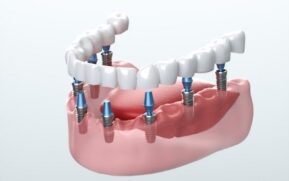
Oral or maxillofacial surgery is a type of reconstructive surgery performed on the gums, teeth, jaws, and other oral structures of patients in order to treat irregularities. Oral surgeries are performed by experienced maxillofacial surgeons who are specialists in different kinds of surgical procedures, including difficult teeth extractions, removing impacted wisdom teeth, placing dental implants, bone grafting, etc.
An Oral surgeries are invasive treatments performed for severe oral problems that cannot be treated through non-invasive dental procedures. Maxillofacial surgeries typically eliminate the following oral problems:
- Extensive tooth decay
- Badly broken teeth
- Gum disease
- Impacted teeth
- Missing teeth
- Temporomandibular joint disorders (TMD).
- Bone loss in your jaw
- Sleep apnea
- Oral cancer
- Benign oral pathology
There are numerous kinds of oral surgical procedures performed to treat the above-mentioned issues. Some of the most common treatments usually include tooth extraction, dental implants, periodontal surgeries, sleep apnea surgery, dental bone grafts, corrective jaw surgery, and cleft lip and palate repair.
Dental Implant Installation
Dental implants are a very popular and widely preferred dental approach in order to replace missing or extracted teeth, and they are installed through oral surgery performed by experienced oral surgeons. The implant is a titanium or zirconium screw that is surgically placed into the jawbone of the patient.
After the placement of dental implants, a crown is attached to the implant depending on the type and material of the implant and how healthy the patient’s jaw is. In some cases, dentists have to wait for up to six months for surrounding bone tissues to properly heal and fuse with the implant.
Tooth Extractions
In some severe cases when the natural teeth cannot be saved through any dental procedure, dentists recommend extracting it in order to save the functionality of surrounding teeth and to stop the spread of damage.
This surgical extraction is performed by an oral surgeon who makes an incision into the patient’s gums so the tooth can be exposed and extracted.
This procedure can be painful for patients; that’s why it is usually performed under the effect of anesthesia. The most common reasons why a tooth gets extracted might be severe tooth decay, damage, inflammation, or infection.
Bone Grafting
Bone grafting is a type of maxillofacial surgery that becomes necessary when severe bone loss has occurred in the patient’s jaw. There are multiple reasons why this occurs. When our natural teeth are healthy, their roots stimulate the nerves in the jaw, which signals our brain to send nutrients to the jaw.
This keeps it healthy and strong. But if a tooth or a number of teeth have been missing for extended periods, bone deterioration might occur in that particular area because there are no roots left to stimulate the nerves. The bone graft surgery restores the density and volume in the jawbone so that dental implants can be inserted later on.
Sometimes, dentists might place a bone graft during periodontal surgery. Bone graft surgery reduces mobility and provides a solid foundation, keeping the patient’s teeth healthy and strong.
Corrective Jaw Surgery
Corrective jaw surgery is also called orthogenetic surgery, which is used to fix a variety of major and minor skeletal or dental irregularities, like a misaligned jaw. This restorative procedure can significantly improve the patient’s ability to speak, breathe, and chew properly.
Sleep Apnea Treatment
Surgical intervention is sometimes required to address problems like sleep apnea. This condition leads to the blockage of a person’s airways or respiratory tract during sleep. This leads to disturbance in the sleep cycle of patients as their body wakes them to restore proper breathing. This surgery removes excess soft tissue that is becoming a reason for blocking a patient’s airways. This treatment is considered a permanent solution for some cases of sleep apnea.
Periodontal Surgery
If someone has severe periodontitis, the orthodontist specialist might recommend gum disease treatment. This procedure is carried out by making incisions along the gum line. And the tissue is temporarily moved back away from the patient’s teeth. The oral surgeon will then clean the roots of teeth and will flush away bacteria and plaque that have accumulated under the patient’s gums. After that, the gum tissue is sutured and repositioned into place.
In some cases, gum recession can also occur as a result of periodontitis. Some conditions, a patient might need a gum graft. In this procedure, the oral surgeon reinforces the area of lost tissue with the donor tissue.
Cleft Lip and Palate Repair
A cleft lip is an opening in the upper lip, and babies born are also born with a cleft palate that has an opening in the upper part of their mouth. Cleft lip and palate occur when the facial structures do not completely develop. Maxillofacial surgeons generally perform cleft lip and palate surgery in order to restore the normal functioning of a child’s mouth, which allows him to eat and speak without any hindrance throughout his life.
FAQs:
What Is the Procedure Involved Before Undergoing Oral Surgeries?
Before performing oral surgeries, the healthcare provider usually performs a comprehensive evaluation of the patient’s mouth in order to thoroughly assess the condition of his gums, teeth, jaw joints and surrounding oral structures. Orthodontists also take X-rays and scans to get a clear picture of the patient’s jawbone, teeth roots, nerves and other important oral structures. Using this specific information, orthodontists tailor a treatment plan.
What Happens After Oral Surgery?
Following the surgical procedure, patients are usually given detailed post-operative instructions. It’s important to follow all the guidelines closely to minimize the risk of infections, bleeding, or other complications post-surgery.
What Are the Risks or Complications of Oral Surgery?
As with any other surgical procedure, patients should be aware of the complications and risks associated with maxillofacial surgeries, which might include:
- Infection.
- Injury to adjacent teeth.
- Dry socket.
- Numbness.
- Tooth root fragments.
- Sinus problems.
However, patients can effectively minimize the risk of these above-mentioned problems. And complications by following the post-operative guidelines recommended by the surgeon and by taking the prescribed medications.






